Overfishing
071 Overfishing - What is Overfishing?
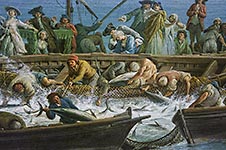 Overfishing occurs when more fish are caught than the population can replace through natural reproduction. Gathering as many fish as possible may seem like a profitable practice, but overfishing has serious consequences. The results not only affect the balance of life in the oceans, but also the social and economic well-being of the coastal communities who depend on fish for their way of life.
Overfishing occurs when more fish are caught than the population can replace through natural reproduction. Gathering as many fish as possible may seem like a profitable practice, but overfishing has serious consequences. The results not only affect the balance of life in the oceans, but also the social and economic well-being of the coastal communities who depend on fish for their way of life.read more: WWF
Extensive article and links: overfishing.org
What can I do to help?
You can help stop overfishing.
Painting: (detail) Joseph Vernet (Avignon, 1714 - Paris, 1789) ´La Madrague ou la Pêche au thon´, 1755
©: www.musee-marine.fr/paris (photo: Robert Schilder 2014)
tags: #musee marine paris #overfishing
ref. # 071a Overfishing - Overfishing
 Afrika SCH 24 Scheveningen, a Dutch super trawler fishing 30 miles off the coast of Mauritania. Greenpeace is campaigning in West Africa for the establishment of a sustainable, low impact fisheries policy that takes into account the needs and interests of small-scale fishermen and the local communities that depend on healthy oceans.
Afrika SCH 24 Scheveningen, a Dutch super trawler fishing 30 miles off the coast of Mauritania. Greenpeace is campaigning in West Africa for the establishment of a sustainable, low impact fisheries policy that takes into account the needs and interests of small-scale fishermen and the local communities that depend on healthy oceans."Despite subsidised reductions, the EU fishing fleet still has the capacity to fish two to three times the sustainable level. Between 2007 and 2013, the EU's European Fisheries Fund will have subsidised fishing and related industries with € 4.3 billion. Fuel for fishing vessels is exempt from energy taxes, and State aid and EU-funded fisheries partnership agreements with non-EU countries also serve to subsidise fishing fleets and the fishing industry across the European Union."
www.pewtrusts.org
Can We Help Stop Overfishing? you can
©: photo: Pierre Gleizes / Greenpeace
tags: #overfishing
ref. # 071b Overfishing - Transhipment of fish at sea
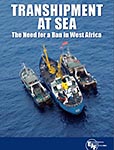 Transhipment of fish at sea in West Africa and a ban on the entry of seafood from such transhipments into the European market.
Transhipment of fish at sea in West Africa and a ban on the entry of seafood from such transhipments into the European market.Environmental Justice Foundation's (EJF) Pirate Fishing Campaign
EJF investigations show that many industrial fishing vessels are out of control: fishing well inside exclusion zones, attacking local fishers, refusing to pay fines, covering their identification markings, using banned fishing equipment, transhipping fish illegally at sea, refusing to stop for fisheries patrols, bribing enforcement officers, fleeing to neighbouring countries to avoid sanctions, and committing labour violations.
©: www.theguardian.com
tags: #EJF #Sierra Leone #transhipment of fish
071c Overfishing - Purse seiner
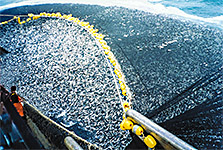 About 400 tons (FOUR HUNDRED TONS) of Chilean jack mackerel (Trachurus murphyi) are caught by a Chilean purse seiner off of Peru.
About 400 tons (FOUR HUNDRED TONS) of Chilean jack mackerel (Trachurus murphyi) are caught by a Chilean purse seiner off of Peru.©: Image ID: fish2172, NOAA's Fisheries Collection 1997 Photographer: C. Ortiz Rojas www.photolib
tags: #NOAA #purse #seiner
ref. # 072 Overfishing - Seaweed
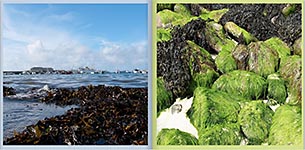 "Seaweed offers perhaps the broadest range of minerals of any food found on earth, equal to those found in human blood.
"Seaweed offers perhaps the broadest range of minerals of any food found on earth, equal to those found in human blood.Seaweed is an excellent source of the B-vitamin Folate, Magnesium, Iron, Iodine, Calcium, Phosphorous and the B-vitamins Riboflavin and Pantothenic acid. It also contains vitamins A, B1, C, E, and Protein.
In addition, seaweed contains significant amounts of lignans, which are plant compounds with cancer-protective properties. The most recent studies on seaweed revealed that its bioactive substances aid in reducing blood pressure and cholesterol, plus its ability to deal with free radicals that are the cause of cancer."
©: www.nutri-health.co.uk
tags: #seaweed
NB In the English language we have done ourselves a disservice calling it "seaweed": weeds are something we do not want, seaweed implies something negative about the product. When trying to convince others to eat it, "sea plants" or "sea vegetables" may be more appropriate words to describe it.
Extensive article www.fao.org
ref. # 072a Overfishing -Noordzee boerderij - North Sea Farm
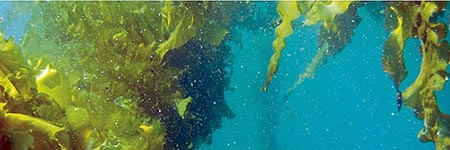 ´A new way of cooking´
´A new way of cooking´"Sushi, soups and salades, straight from the North Sea to the kitchen table. That will be the future in a couple of years, according to the Stichting Noordzeeboerderij (North Sea Farm Foundation). They planted edible seaweed near the coast of the island of Texel (north of the Netherlands) and harvested the first crop last week of June. The seaweed grows on a large frame, floating one meter below the sea´s surface.
This is only the start, because they are allowed a ´pasture´ of a square kilometre with the possibility of growing shelfish at the same time.
Seaweed is more than just food, it is a part of for instance toothpaste, chocolatemilk and cosmetics. Besides that, it forms a safehaven for small fish and it is environment friendly. No need for land, fertilizer or precious sweet water."
©: the test is an intiative of Schuttelaar & Partners Consultancy (NL)
www.noordzeeboerderij.nl/en
tags: #Noordzee boerderij #North Sea Farm
ref. # 072b Overfishing -'Fish oil made from GM plant to be saviour of the oceans'.
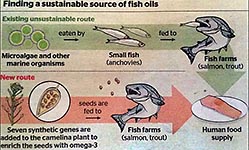 Fish oil has been grown successfully on a British farm in a scientific breakthrough that could reduce the plundering of the oceans
Fish oil has been grown successfully on a British farm in a scientific breakthrough that could reduce the plundering of the oceansA field trial in Hertfordshire has demonstrated that plants can be genetically modified to reproduce the nutrients found in oily fish that protect against heart disease and help infant brain development.
Scientists genetically modified camelina, an oilseed plant known as "false flax" to produce seeds containing the omega-3 fatty acids present in salmon, mackerel and herring.
©: Ben Webster (environment editor) in The Times 8/7/2015
tags: Fish Oil #GM #omega-3
ref. # 072c Overfishing - Sustainable fisheries
 "Sustainable management of fisheries cannot be achieved without an acceptance that the long-term goals of fisheries management are the same as those of environmental conservation"
"Sustainable management of fisheries cannot be achieved without an acceptance that the long-term goals of fisheries management are the same as those of environmental conservation"- Daniel Pauly and Dave Preikshot
Fishers remove more than 77 billion kilograms (170 billion pounds) of wildlife from the sea each year. Scientists fear that continuing to fish at this rate may soon result in a collapse of the world's fisheries. In order to continue relying on the ocean as an important food source, economists and conservationists say we will need to employ sust´inable fishing practices.
©: education.nationalgeographic.com
tags: #sustainable fisheries
072d Overfishing -Sustainable fisheries
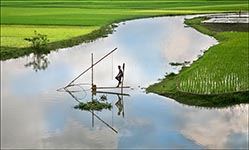 "In the end, we will conserve only what we love; we will love only what we understand; and we will understand only what we are taught"
"In the end, we will conserve only what we love; we will love only what we understand; and we will understand only what we are taught"- Senegalese conservationist Baba Dioum,
©:Wikipedia
tags: #sustainable fisheries
ref. # 072e 2015 travel journal -Aquaponics
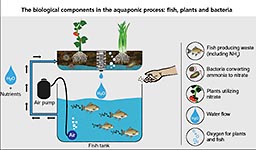 Aquaponics is the integration of recirculating aquaculture and hydroponics in one production system. In an aquaponic unit, water from the fish tank cycles through filters, plant grow beds and then back to the fish. In the filters, the fish wastes is removed from the water, first using a mechanical filter that removes the solid waste and then through a biofilter that processes the dissolved wastes. The biofilter provides a location for bacteria to convert ammonia, which is toxic for fish, into nitrate, a more accessible nutrient for plants. This process is called nitrification. As the water (containing nitrate and other nutrients) travels through plant grow beds the plants uptake these nutrients, and finally the water returns to the fish tank purified. This process allows the fish, plants, and bacteria to thrive symbiotically and to work together to create a healthy growing environment for each other, provided that the system is properly balanced.
Aquaponics is the integration of recirculating aquaculture and hydroponics in one production system. In an aquaponic unit, water from the fish tank cycles through filters, plant grow beds and then back to the fish. In the filters, the fish wastes is removed from the water, first using a mechanical filter that removes the solid waste and then through a biofilter that processes the dissolved wastes. The biofilter provides a location for bacteria to convert ammonia, which is toxic for fish, into nitrate, a more accessible nutrient for plants. This process is called nitrification. As the water (containing nitrate and other nutrients) travels through plant grow beds the plants uptake these nutrients, and finally the water returns to the fish tank purified. This process allows the fish, plants, and bacteria to thrive symbiotically and to work together to create a healthy growing environment for each other, provided that the system is properly balanced.©: Food and Agriculture Organization of the United Nations Rome, 2014
ISBN 978-92-5-108532-5 (print) E-ISBN 978-92-5-108533-2 (PDF)
tags: #Aquaponics
